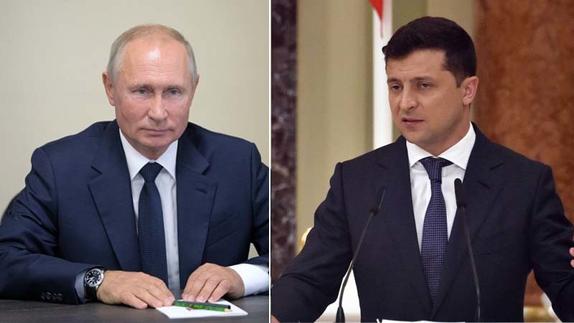 This combo photo shows Russian President Vladimir Putin (left) and Ukrainian President Volodymyr Zelensky. (PHOTOS / AFP)
This combo photo shows Russian President Vladimir Putin (left) and Ukrainian President Volodymyr Zelensky. (PHOTOS / AFP)
MOSCOW/BERLIN - Russian President Vladimir Putin and Ukraine's Volodymyr Zelensky discussed the conflict in eastern Ukraine and both expressed support for a ceasefire that starts on July 27, their offices said on Sunday.
Ukrainian, Russian and OSCE negotiators agreed on a full ceasefire between government forces and pro-Russian separatists in eastern Ukraine from late July, putting on hold the military conflict that claimed more than 13,000 lives since 2014.
The leaders agreed on the need for an urgent implementation of extra measures to support the ceasefire regime in Donbass.
Ukraine President Volodymyr Zelensky's office
"The leaders agreed on the need for an urgent implementation of extra measures to support the ceasefire regime in Donbass," Zelensky's office said, referring to eastern Ukraine.
Zelensky came to power last year promising to end the conflict. Since then, Ukraine and Russia have implemented some confidence-building measures, including prisoner swaps and phased troop withdrawals in designated areas.
Putin told Zelenskiy in a phone call that Ukraine's decision to hold regional elections in 2020 contradicts the Minsk peace accords aimed at resolving the conflict.
Kyiv plans to hold local elections in October across the country apart from breakaway Donetsk and Luhansk regions.
Zelensky's office said the Ukrainian president told Putin that further steps were needed to free Ukrainian citizens being held in eastern Ukraine, Crimea and Russia.
ALSO READ: Russia, Ukraine leaders, in first talks, agree prisoners exchange
Germany rejects Trump's proposal to let Russia back into G7
Germany has rejected a proposal by US President Donald Trump to invite Putin back into the Group of Seven (G7) most advanced economies, German Foreign Minister Heiko Maas said in a newspaper interview published on Monday.
Trump raised the prospect last month of expanding the G7 to again include Russia, which had been expelled in 2014 following Moscow's annexation of Ukraine's Crimea region.
But Maas told Rheinische Post that he did not see any chance for allowing Russia back into the G7 as long as there was no meaningful progress in solving the conflict in Crimea as well as in eastern Ukraine.
Germany's foreign minister said he did not see any chance for allowing Russia back into the G7 as long as there was no meaningful progress in solving the conflict in Crimea as well as in eastern Ukraine
Russia itself could make the biggest contribution to becoming part of the G7 format again by contributing to a peaceful solution in the Ukraine conflict, Maas said.
READ MORE: France 'wants progress in Ukraine before Russia returns to G7'
Russia is still part of the G20, a broader grouping including other emerging-market economies.
"G7 and G20 are two sensibly coordinated formats. We don't need G11 or G12 anymore," Maas said in reference to Trump's proposal to invite not only Russia, but other countries to G7 meetings.
Maas described the relationship with Russia as "currently difficult" in many areas. "But we also know that we need Russia to solve conflicts such as those in Syria, Libya and Ukraine. That will not work against Russia, but only with Russia."
Germany, which took over the rotating six-month EU presidency on July 1, has taken on a mediating role in the conflict in Libya as well as in Ukraine.
"But Russia also has to make its contribution, which is very slow in Ukraine," Maas said.


